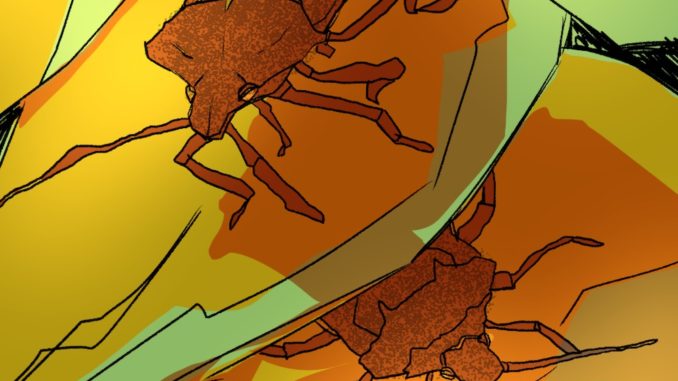
By Andrew Hayes
As the weather warms and the flowers begin to bloom, Lewis & Clark’s faculty and students prepare for the sun, the springtime air and the bugs that come with it. Desperate for vitamin D after the long rainy season, more students have been leaving their dorm rooms and laying in the grass around campus to bask in the sun.
For the same reason as the students, insects such as marmorated stink bugs (also known as shield bugs) come out of hibernation and populate the campus.
Visiting Assistant Director of Biology Bianca Breland specializes in evolutionary ecology and invasive species biology.
“It’s a normal thing that the bugs diapause and hibernate in the winter when there’s nothing to eat,” Breland said. “Then they emerge in the spring, just as everything else gets going in the spring. (Bugs) provide food to bird and mammal species and they each have their ecological role to play, so I welcome the return of the bugs.”
However, Breland, who researches invasive species, said that she dislikes the non-native stink bugs which inhabit LC’s campus.
“There are so many of them and they fly around my head when I am lecturing, I find them quite annoying,” Breland said. “Those bugs are not ones I would carry outside and set free. Those are bugs that when I find them, I would squash them.”
Because of her past experiences, Sarah Jett ’19 displays a similar attitude towards these insects.
“I have had interesting experiences with the shield bugs,” Jett said. “I have left my window open, which has a screen, but they still somehow end up coming into my room and buzzing all around. The worst part is when you can’t find them right away. You come into your room a couple days later and it smells gross then realized a bug died in your room. It’s also not fun when you accidentally squish them and they stink up your entire room and your hands.”
Ruthie Hall ’21 relates to this frustrations over the prevalence of this species in the spring.
“I have had many unwanted stink bugs in my room,” Hall said. “They also have stayed in the kitchen for a long time and used to always stay on my dishes. Last semester they flew into my room a lot and I really did not want them in there.”
Hall explains that this aversion to stink bugs does not apply to all other insects.
“I am a really big supporter of the ‘save the bees’ movement,” Hall said. “I started my own hive at home because I wanted to do what I can to help, even if my efforts have a minimal effect. I really like butterflies and dragonflies as well.”
Breland said the importance of pollinator species such butterflies and bees is vital for plant populations in seasons of reproduction.
“The pollinators are essential in crossing the flowers that are blooming right now,” Breland said. “Sometimes the flowers are out before the bugs are and if the bugs do not come out soon enough, then we do not get a good yield on those (plant) species.”
The growth of bug populations may cause discomfort for some, but Breland said we should look past our discomfort.
“I think it might be overplayed,” Breland said about the stigma against insects. “A lot of people have their thing, one kind of bug, bees, spiders or something of that sort. Bugs generally shouldn’t be things that people are bothered by, except for (species) that are biting or stinging. Those are the things people give a second thought to.”
Subscribe to the Mossy Log Newsletter
Stay up to date with the goings-on at Lewis & Clark! Get the top stories or your favorite section delivered to your inbox whenever we release a new issue.

Leave a Reply